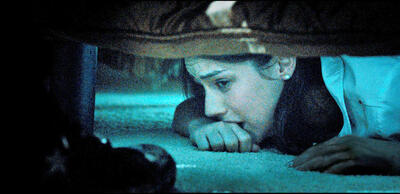Genre Research: Thriller

Common Camera Angles:
- In thriller movies, the director aims for the audience to see the actors's face, and typically will use all kinds of angle in order to display what details are going on in the movie. For example, a low angle will be used to show a monster on the roof, while a high angle will be used next in order to show his point of view.
- Thriller movies are typically set in a confined space like a house, meaning that large, crane or sweeping movements are not likely. Some movements used are stills, simple pans, and tracking movements.
- A common shot used in a thriller is a close-up. Using a close up allows the director to instill a sense of fear and anxiety into the audience, making them feel how the character in the movie feels. Thriller movies are not only limited to close-ups though, as establishing shots are also used plenty, as well as over-the-shoulder shots to display dialogue.
- Thrillers will usually be in a normal setting of everyday life, meaning that the costumes in this genre may not be complex or intricate. Most thrillers will have characters with normal lives, and were thrown into this scenario unexpectedly.
- Thrillers will often show dark environments, such as a haunted mansion. For this, directors will use soft or very low lighting to convey the idea of suspense or ambiguity.
- This genre aims to scare and anticipate the audience, meaning that the ideas and emotions that the characters are feeling must be conveyed to the audience. It is for this reason that the actors in thrillers will usually be ones of very high caliber, and are able to convey emotions like fear in such tense scenes.
- A common theme in thrillers is character injury, not on par with something like horror, but nonetheless present. The makeup used in scenes like this will likely use fake blood, dust, dirt, and anything to show the state of the actors.
- Many thrillers are fiction, meaning that the film will likely contain objects that do not exist in real life. In addition to standard movie props like furniture and guns, thriller movies may contain special props in order to interest the audience.
- Thrillers are similar to horror movies, and will usually include a dark environment, and illustrate normal settings as "unsettling" or "out of place."
- Thrillers specialize in making the audience tense, and for this reason scenes that include lots of tension will feature stable cameras, with an occasional shot/reverse shot.
- Sounds used in thrillers are very important, as directors take their time to put many little things in place in order to meticulously control the audience's emotions. Non-diegetic, as well as diegetic sounds are used, and lots of sound effects are added in in order to create the sense of horror, such as creaking floor boards.
Some recent thriller films are:
- Old
- Get Out
- Run
- Unhinged
- Split
As much as thriller has its favorable parts, there are a few things that bother me about the genre. For example, many thriller movies take their time and set up special scenarios with the protagonist and antagonist. This period is very unreasonable to me, and while watching it as a film, it may come across as boring. Additionally, sound design in thrillers are unappreciated at times, however, it will be a huge investment of time in order to create a thriller opening sequence.

Comments
Post a Comment